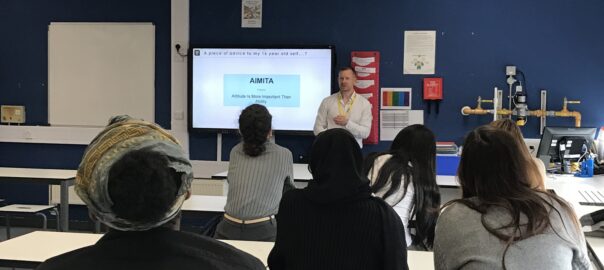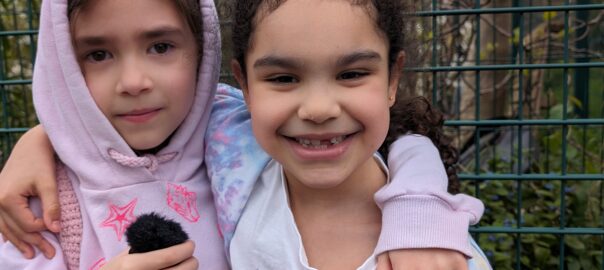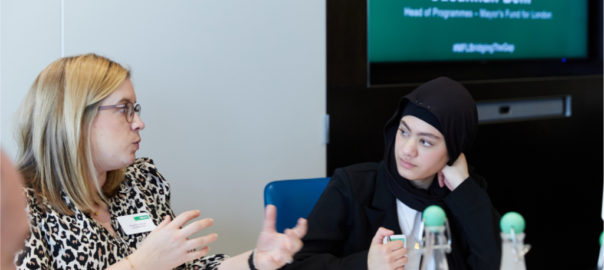In conversation with… Yetunde Olakigbe

The theme for Black History Month this year has been ‘Saluting Our Sisters’. Through a series of conversations, we are proud to highlight and platform four inspirational Black women who are creating a lasting impact in their communities, on generations of young people and their families. The interviews explore their personal experiences, inspirations, and motivations, and reflect on why Black History Month is so important.
Today, we spoke to Yetunde Olakigbe who is a Manager at PlayZone Out of School Care, an organisation that provides young people and their families with breakfast, afterschool & holiday clubs.
Can you tell us about your personal connection to Black History Month and what it means to you as a Black woman in London?
As a Black woman, I feel love and a sense of belonging in the society I live in, being celebrated as an African woman raising future generations of Black children who now have the opportunity to make an impact in empowering others and become part of what we celebrate as history in modern society. Black History Month is an opportunity to celebrate and honour the great achievements of Black people in the world and to change the narrative of perception on Black people. It is also an occasion to educate the world about equality in the world, diversity and indifference amongst human beings.
London is one of the most diverse cities in the world, and it is important we showcase the beauty of that. We are showcasing and educating the rich heritage of various cultures, promoting understanding of diversity and ultimately breaking down the walls of fear and ignorance of the definition of Black History Month.
Who are some Black women in British history who have inspired you and why?
There are so many Black women that have inspired me!
One that stands out for me is Jessikha Inaba, who in her early 20s, recently became is the first blind Black female barrister in the UK. Jessikha made British history in 2022, and did not see challenges but opportunity in the land where she lives. In an interview with The Times: she said: “I know I can do this job well, and the more people like me who go through training the easier it will become. I know I’m giving hope to others in similar situations.“ Breaking barriers is a great power that paves the way for those who need hope to face the future…because being Black, a woman or disabled is not, and should not be, a barrier to achieving our goals.
Another person of inspiration is Mary Seacole who was a British Jamaican nurse who worked tirelessly during the Crimean War by helping the sick and wounded. The inspiration for me was the fact that, it was not recorded that she was very rich or that she got support. But that she broke social rules and prejudices to travel the world, run businesses and help those in need – even in the most dangerous places. Whatever we have, in terms of skills or talent, even just tolerance can change our world for the best.
What quote keeps you going?
“Your value doesn’t decrease based on someone’s inability to see your worth…” by Tamera Mowry-Housley.
Like I said earlier, non-recognition or lack of support should not frustrate one’s effort to make a difference. Making the world a better place should be the goal.
How can those who aren’t of Black heritage become active allies?
We all need to learn how to work together as each other’s allies, understand the power of diversity and come together to make changes in society so that oppression is not accepted. Those without a Black heritage can learn, support, empower and stand up for what Black History Month and Black lives stands for. By also understanding the power of supporting each other in our struggles of making the world a better place, making a difference in our community, impacting our world positively, keeping our youth safe, creating a safe environment for future generation regardless of colour of our skin.
What is your go-to meal when cooking for others? What makes it so special for you?
Moin-moin – it is made from oloyin beans (honey beans) or black eyed beans, smoked fish, shell fish, prawns and eggs. It is a protein rich Yoruba food that is commonly eaten in West Africa and across the world. It is a healthy and delicious meal that brought the community together on several occasions when I was growing up. We would cook it in large quantities, open our doors to friends and neighbours and eat together. It is a major part of my upbringing.
Jollof rice is another delicious meal – a rich delicacy that used to be very common in West Africa but, now common and well-loved around the world. Jollof rice can be seen in not just Black community parties but, in other cultural gatherings. It is a healthy diet of rice cooked in vegetables and a variety spices served with chicken as protein.
As we celebrate Black History Month, ‘Saluting Our Sisters’, what message or legacy would you like to leave for future generations of Black women in London?
No one should be limited by the colour of their skin, just believe that you can achieve whatever you set your mind on. However, do not forget to celebrate your culture as that is an important part of who you are.
To find out more, visit: playzonecentres.co.uk/Playzone2



